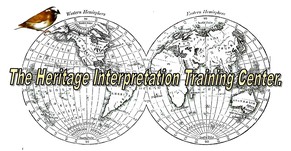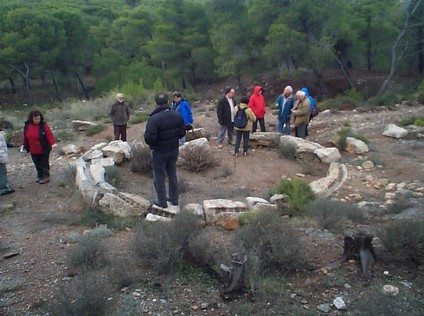John Veverka & Associates
Main menu:
- Home Page
- Our Range of Services
- Interpretive Coaching
- Interpretive Planning
- Interpretive Plan Outline
- Interpretive Training
- John Veverka Resume
- NEW Advanced Interp. Text Book
- InterpNEWS
- Library
- JVA NEWS, Courses and Updates
- Certificates
- Planning/Design of Interpretive Panels
- Interpretive Writing
- Interpretive Writing Course
- Interpretive Trails Course
- Interpretive Panels Course
- Introduction to Heritage Interpretation Course
- Interpretive Planning & Design of Marketing Brochures Course
- Training for Interp. Trainers
- Interpretive Exhibits Course
- Interpretive Master Planning Course
- Interpretive Planning for Scenic Byways.
- Critiquing and Coaching Interpretive Staff
- Advanced Interpretive Planning
- Interpretive Training Center Course Catalogue
- Interp. for International Visitors course.
- Interpretive Exhibits Evaluation
- Interp. Center Feasibility Analysis Course.
- Interp. for Commercial Tour Providers
- Interpretive Researchers Guide for Visitor Studies
- Interp. Planning for Historic Homes
- Heritage Interpretation Training Center
- Interpretive Planning for Botanical Gardens
- An introduction to planning and presenting live interpretive programs and tours for Museum/Heritage Site Docents and Volunteers.
- Developing Marketing Plans for Heritage & Tourism Sites and Attractions
- Interpretation Book Store
- Heritage Interpretation Resource Center
- Interpretive Planning for Historic Farms
- Developing Successful Partnerships
- Developing Interpretive Outreach Programs
- Community Interpretation Planning
- Interpreting Gravestones and Historic Cemeteries
- Using Interpretation to Accomplish Management Objectives.
- An Interpreters Guide for Survival Economics.
- Innovative Strategies for Interpretive Media and Services Planning.
- A Curators Guide for Developing Gallery Tours.
- Advanced Interpretive Writing - Technical Publications
- Advanced Interpretive Services for Managers, Supervisors, Team Leaders and Sr. Staff.
- Advanced Interpretation for Chiefs of Interp. - Interpretive Managers - Regional Interp. Specialists
- Interpreting Critical Issues.
- Developing Commercial Interpretation for Resorts, Cruise Ships, Campgrounds and Tourism Attractions.
- Planning and developing a new commercial tour guiding business.
- Interpretive Evaluation, Visitor Studies and Site Assessment Center
- The Center for Interpretive Planning Advancement & Excellence.
- Developing Requests for Proposals (RFPs)
- Planning and Facilitating Focus Workshops
- Planning for Interpretive Experiences
- 40 Years a Heritage Interpreter
- Interpretive Techniques - The Rest of the Story Course
- Certified Professional Interpretive Planner Certificate
- Certified Professional Interpretive Program
- Certified Professional Interpretive Writer certificate program.
- Visitor motives for attending interpretive programs.
- Exhibit Rehab Course
- Developing Training Workbooks & Manuals
- Planning for Railroad Museums and Sites.
- Climate Change Interpretation Course.
- When there's nothing left but the story - interp. storytelling.
- Interpreting Legends Myths and Fables
- InterpSHARE - Seminars 2022
- Interpreting Invasive Species
- Interpretiing Edible Insects
- Interpretaive Planning for Climate Change
- HITC Climate Crisis Resource Center
- PUP Members Only
- Starting a new Interp Consulting Business
- Panels 4 Week Course
- Interpretive Writing - 4 Week Course
- Marketing - 4 Week Course
- Intro to Interpretation - 4 Week Course
- Interp Climate Change - 4 Week Course
- Exhibit Rehab 4-Week Course
- Level 1
- Johns Interpreters Blog
- John Interpreters Blog 2
Visitor motives for attending interpretive programs.

Visitor motivations for selecting/attending (or not attending)
interpretive programs and services.
A visitor-centered course on how to increase your visitor program
participation numbers (attendance) in/at interpretive programs/services and experiences,
based on research from visitor interpretive content/topic preferences and expectations.
Course Tuition: $300.00 (3.5 CEU's).
Archaeology site interpretive tour - Athens.
Way back in the 1970's working as a seasonal interpretive naturalist with Ohio State Parks for 5 seasons, I observed several things that affected my program attendances including:
- We offered many program topics that almost no one attended.
- We offered some programs that only older park visitors wanted.
- We offered some experiences that only younger visitors wanted.
- We offered programs or experiences that visitors attended, but for different reasons (perceived outcomes).
I felt that we (interpreters) offered interpretive programs for our weekly schedules on topics that WE liked or were interested in - never thinking about program topics or experiences that the visitors might be interested in.
Two seasons of visitor survey research (surveyed over 4000 visitors) at the Ohio State Park I worked at, for my M.S. in interpretation (at The Ohio State University), I wanted to learn, among other things, what program topics the visitors were interested in. I surveyed 90 different program topics, including program topics we actually offered. I also wanted to learn why visitors actually attended programs I was offering. So what did I learn?
- None of the interpretive program topics we actually offered were selected as preferred
program topics that the visitors actually wanted to attend or have an interest in.
- Some program topics were preferred mostly by men.
- Some program topics were preferred mostly by women.
- Some program topics were preferred by both men and women but for different reasons (based
on Maslow's Hierarchy of Needs).
- There were significant program topic preferences differences by different age groups and
genders.
- There were significant scheduling differences as to when visitors wanted to participant in
interpretive programs or experiences.
- And more....
Based on the results, and now 30 years of interpretive consulting work, I consistently think about just who the visitors/market groups are you want, and, what do THEY want? What products are you selling anyway? Thus the "visitor" analysis as part of our interpretive master planning work.
If this course on better understanding your visitor's motivations for selecting and attending interpretive programs or experiences is something you could use, check out the course content below. You can start the course at any time and complete the course at your own pace.
Course tuition includes:
- Copy of John Veverka M.S. Thesis on Visitor Motivations for selecting and attending
interpretive programs.
- E-Copy of Veverka textbook "Interpretive Master Planning".
- Numerous handouts and articles on marketing for interpretation and visitor survey research.
- Handouts on mass customization and markets of one.
- YouTube video introductions for each unit.
- You can call/SKYPE course instructor/coach when you have questions.
The course units combine aspects of interpretive planning, motivational psychology, visitor survey research strategies, interpretive writing for marketing, and visitation tracking.
Unit One - Interpretive Master Planning - the model of interpretive planning.
Unit Two - Visitor motivational psychology - Maslow and visitor needs and motivations.
Unit Three - Visitor survey research/questionnaire development and survey strategies.
Unit Four - Timing is everything - when/where to offer interpretive experiences and program duration.
Unit Five - Using the survey results - markets of one and mass customization.
Unit Six - Creating new visitor-centered interpretive programs/services/experiences (mission, theme reviews and objectives). Interpretive program planning strategies.
Unit Seven - Rethinking marketing - "if you advertise an interpretive program, tour or experience and you ask the visitors to "give you an hour or two of your time", or you charge for your programs or experiences, what benefits for attending the program or experience are you offering them in return? What's in it for them? Are you offering a $1.00 perceived experience for $10.00?
Unit Eight - Interpretive writing for interpretive program/service flyer/web-based advertising.
Unit Nine - Tracking long-term follow-up based on new interpretive program/services offerings. Are your visitor numbers increasing for interpretive programs or experiences?
If you have any questions please feel free to contact me.
John Veverka
Director/Coach
Heritage Interpretation Training Center
jvainterp@aol.com